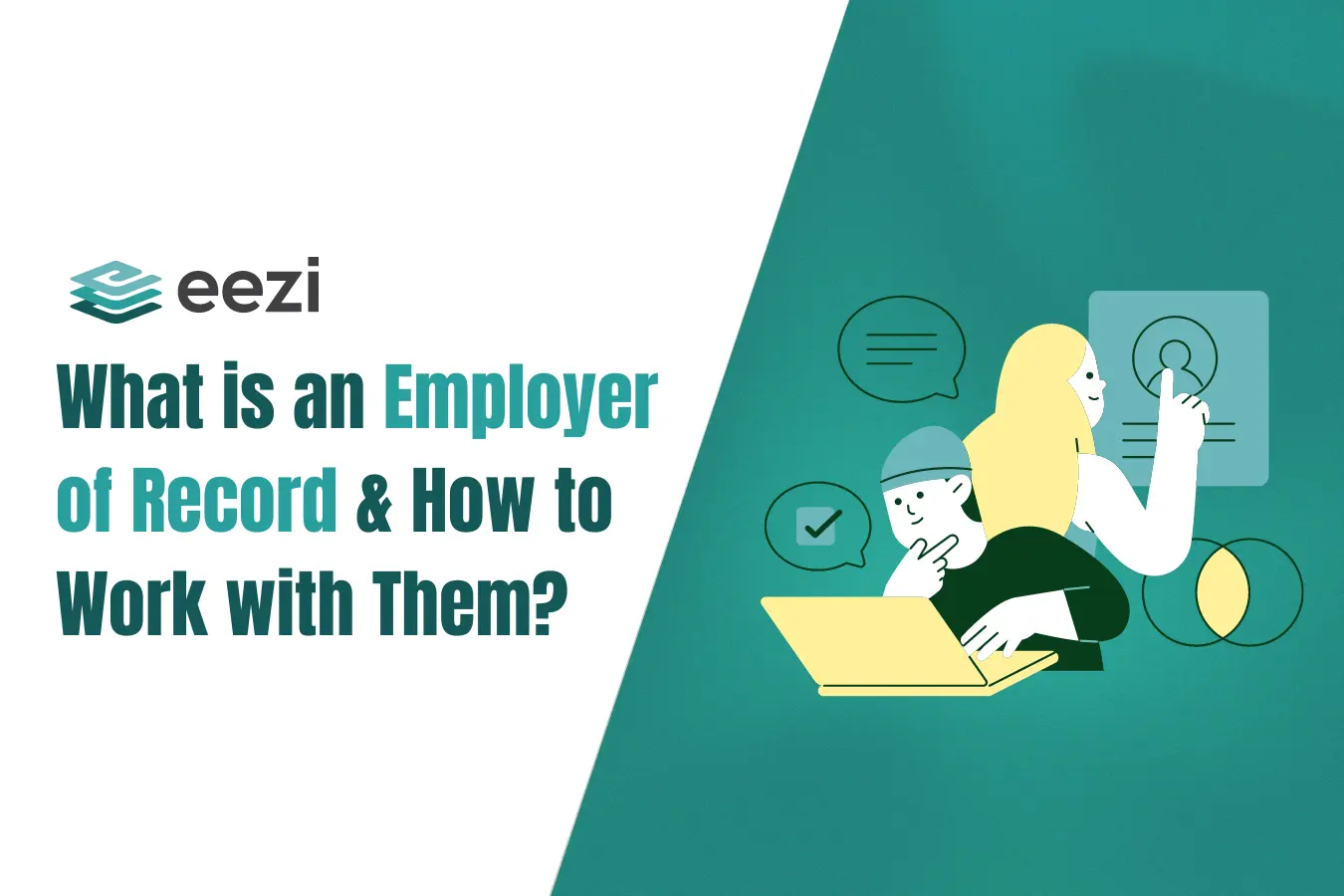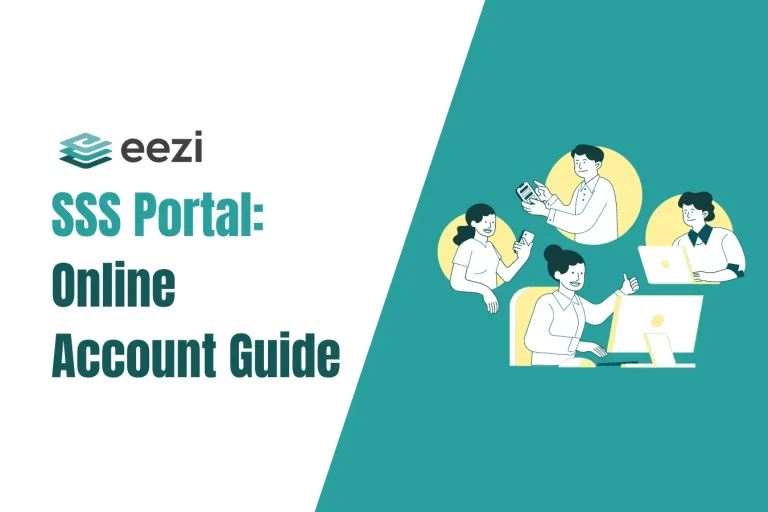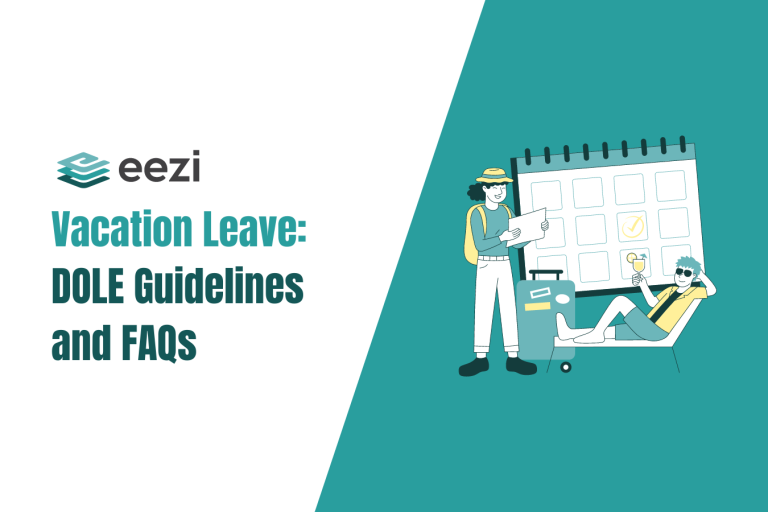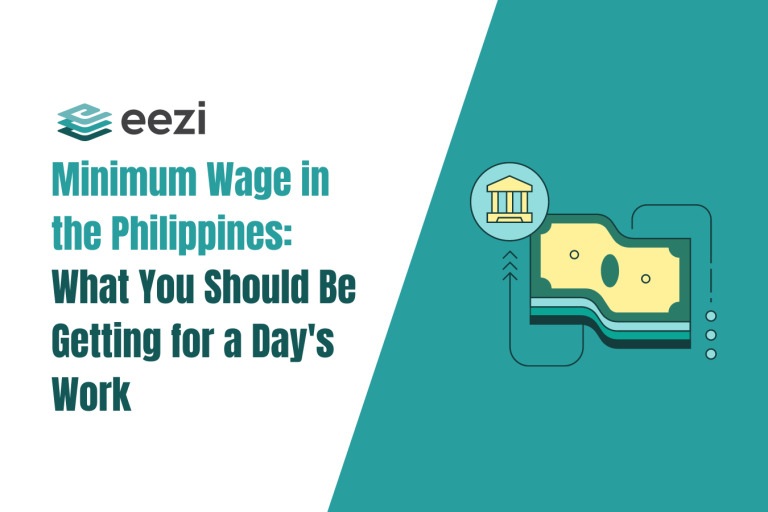What is the employer of record, and how does it work?
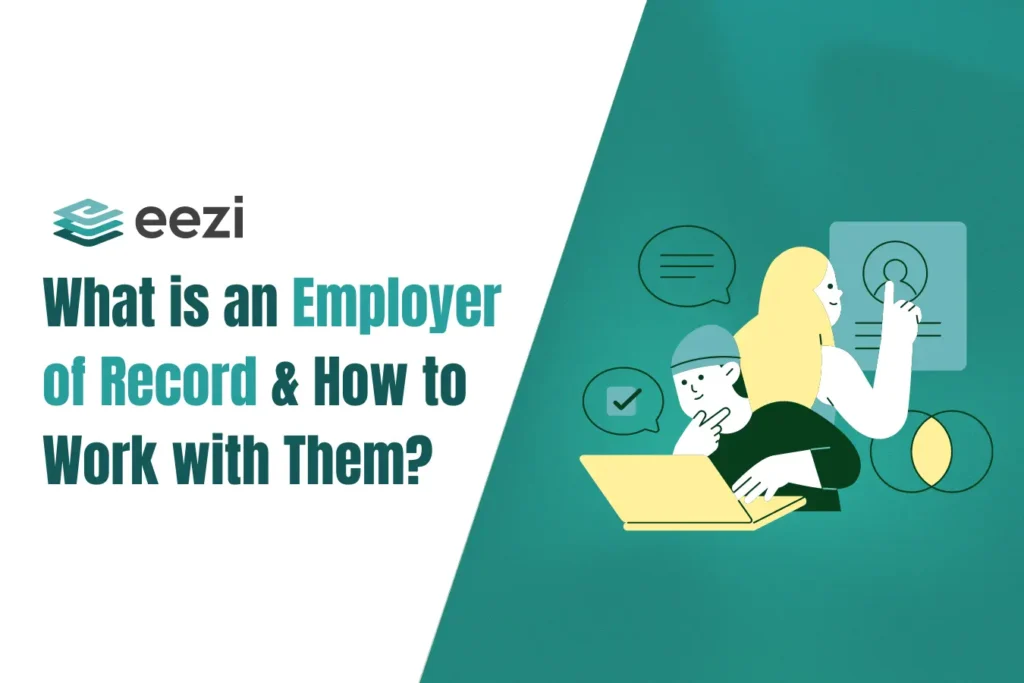
For many companies, the “why” of international expansion is very apparent. They wish to accomplish a goal, expand the customer base, invest in a different business, or tap into a worldwide talent pool. However, the “how” might occasionally be problematic for certain businesses. Yet, with the help of record services, it doesn’t have to be challenging. You need to understand the essential steps and considerations to maximize these services.
An Employer of Record is the fastest way to hire employees in new international markets. All of this is possible without incurring the expense and risk of opening a business in a foreign nation. For a client organization, an EOR provider arranges for all employment obligations.
What is an employer of record?
An employer of record (EOR) is an organization that legally represents an employer in all employment-related matters. The EOR also takes care of the legal and administrative obligations related to hiring.
These can include:
- Unemployment insurance
- Payroll and tax withholding
- Workers’ benefits
- Compliance with local employment laws and regulations
- Workers’ compensation insurance
- Management of taxes in the Philippines, including personal income taxes and employer payroll taxes
EOR is a global employment solution that helps companies hire people legally, quickly, and wherever they may be. Furthermore, this can be accomplished without establishing a legal entity in that particular place.
Therefore, instead of actively seeking out candidates, you can interact with a local in-country partner in your preferred area.
How does an employer of record work?
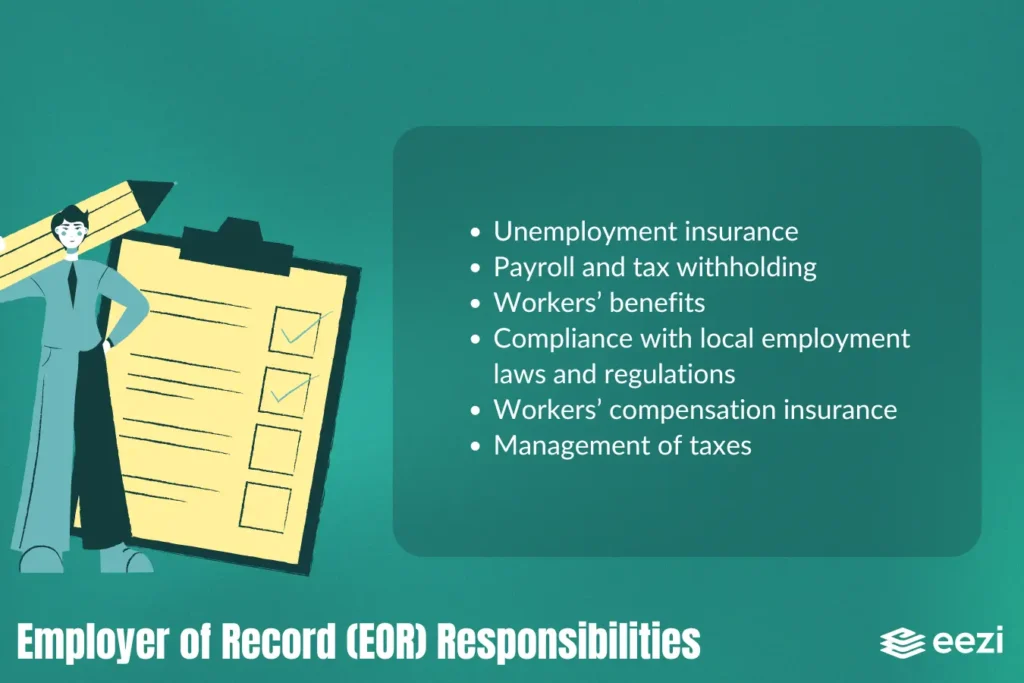
A global Employer of Record (EOR) has already completed the laborious and frequently expensive task of establishing organizations throughout the globe. This covers all banking, insurance, taxes, human resources, facilities, and employment contract requirements. They build an infrastructure to hire and compensate local people by abiding by the employment rules in the area.
EOR services might operate as a legal employer for expanding businesses by hiring workers in the nations where it has establishments. It allows you to hire people overseas without having a local presence. Additionally, the alliance with local knowledge guarantees that you never fall out of compliance.
Employers who utilize an Employer of Record in the Philippines depend on the provider to make employment hires on your behalf. Additionally, they legally assume responsibility for adhering to all local employment laws and payroll regulations.
The following are the usual responsibilities of an employer of record in the Philippines:
- Provides employees with employment contracts that comply.
- Pays taxes, salaries, and benefits that are due
- Assists domestic workers’ HR needs
- An affordable way to handle payroll taxes
It’s crucial to remember that the Employer of Record only manages payroll and HR for full-time employees. The client company oversees the workers’ daily tasks, including performance evaluations and dismissals.
In essence, you gain from the contributions made by in-country employees without exposing your company to risk.
eezi HR Guide
Stay updated with SSS, PhilHealth, Pag-IBIG, and BIR processes.
Pros and cons of an EOR
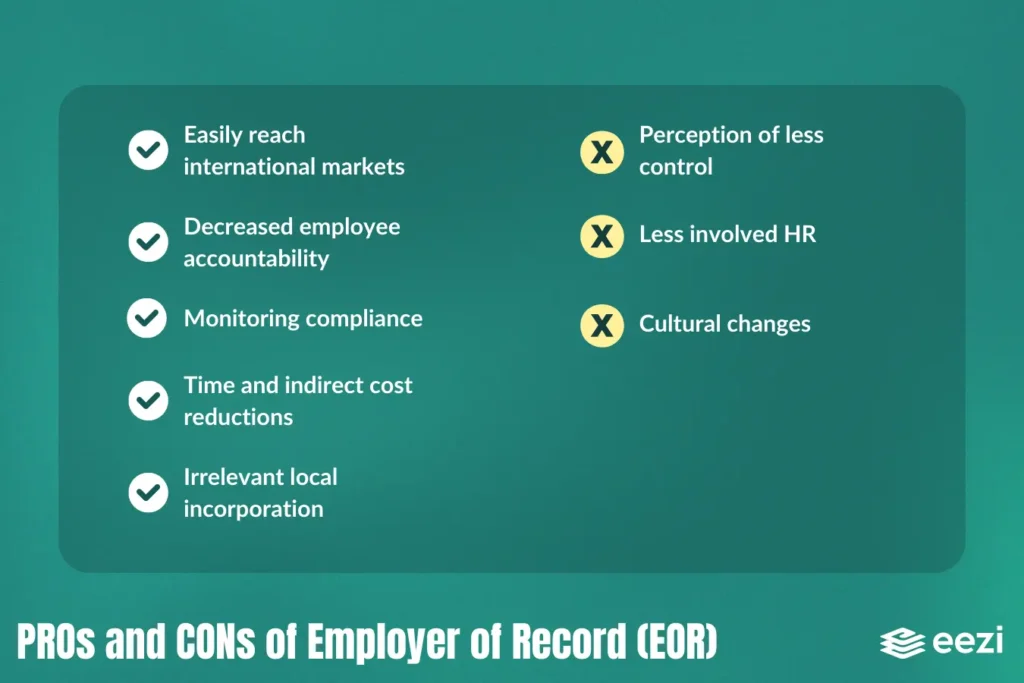
Like any business relationship or service, working with an Employer of Record in the Philippines has both benefits and drawbacks.
Pros of EOR
Partnering with an EOR is a practical and efficient answer to your company’s outsourcing requirements. You, as the client, can save time and money that you can use for more important tasks. Here are the other benefits in the Philippines of Employer of Record (EOR)
Easily reach international markets.
The paperwork involved in registering a business in another nation can take some time — several months, especially in places where bureaucracy is prevalent.
On behalf of the client, hiring and onboarding of staff might be handled by an Employer of Record that is already established in the destination nation.
As a result, work can begin sooner than if you attempted to complete the registration process on your own. Without dealing with the headache of navigating bureaucracy, you may begin seeking the best individuals and working on initiatives immediately.
Decreased employee accountability
They are in charge of ensuring the well-being of the staff members. The government and health maintenance organizations assign the employer of record a number of functions. These responsibilities include handling insurance coverage and payroll processing.
Monitoring compliance
It is not necessary to be familiar with the tax and labor regulations of the nation a customer is hiring from. This is a useful benefit, particularly if the customer runs an international company. Your company will be in compliance with all relevant legislation thanks to the EOR.
The EOR in the Philippines ensures that the handling of your paycheck conforms with national employment regulations. The EOR is in charge of keeping up with local labor laws so that you won’t have to worry about keeping track of compliance.
Time and indirect cost reductions
Business owners can free up more time by partnering with an EOR in the Philippines. You can save hours because you won’t have to deal with payroll and HR issues any longer. Additionally, since you will pay the EOR a fixed rate for each hour the employee works, you will save money.
Irrelevant local incorporation
If you decide against using a third party, local incorporation and registration are required. Due to the requirement for expert accounting and legal support, these procedures are expensive and time-consuming. You may guarantee compliance without going through the trouble of local incorporation by hiring an EOR.
Cons of EOR
Although having an Employer of Record in the Philippines can be a great option, not every firm should choose this approach as it has its disadvantages.
Perception of less control
First, full-time company employees could feel that they have less control when they work with an EOR. Regardless of the EOR’s level of involvement, transferring ownership of essential administrative procedures might be difficult.
Less involved HR
Transferring these procedures will also save significant work from other company teams, particularly HR. Although this isn’t always bad, it may indicate that HR will be less involved in day-to-day operations and that many roles are being outsourced.
To make sure the internal HR department is productive, businesses utilizing an EOR might need to reconsider how it is set up.
Cultural changes
And lastly, implementing an Employer of Record (EOR) could cause cultural changes within the organization. The way an employee perceives their employer may change if key procedures are transferred or if a third party engages them. As long as the business recognizes this challenge and makes a strong effort to create a
How do you select the right EOR for your company?
It’s important to choose record service providers who offer the following features when choosing an employer:
- Fully-owned entities
- International platform
- A broad network of partners
- Broad API and integration capabilities
- 24/7 global support
- Rigorous standards for data security
- No necessity for a minimum number of employees
- Transparent pricing
Selecting an EOR provider who meets these requirements can greatly impact the effectiveness and compliance of your global operations.
How does an employer of record differ from HR software?
An Employer of Record (EOR) is the legal employer of the work or an external provider that takes the legal employment of employees in the Philippines on behalf of a business. On the other hand, HR software is a digital tool that helps an organization optimize and manage its HR objectives and duties.
Does your company need HR software or an employer of record?
Depending on your particular company’s requirements, you may need HR software, an Employer of Record (EOR), or a combination of the two.
Using an Employer of Record is an option if you are hiring people from several countries and are unable to manage compliance on your own.
However, even though most of them will still have an internal HR team and need to handle things such as performance management, knowledge sharing, learning and development, and more, businesses that work with Employer of Record will probably still need an HR software solution.
eezi is the modern all-in-one payroll solution made for SMEs. The platform allows you to focus more of your time on people and less on processes, which is particularly beneficial when managing a remote workforce.
